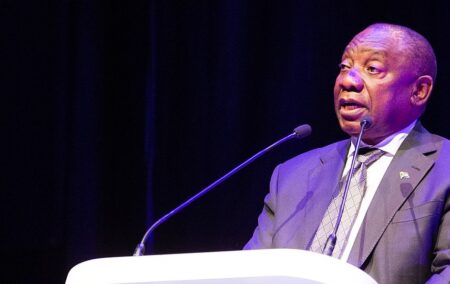Today’s State of the Nation Address will be closely watched for indications of South Africa’s future direction
More than anything, great attention will be paid to any signs that President Cyril Ramaphosa is ready to bring his supposed ‘Long Game’ to a climax.
In other words, after a year of having deferred tough decisions and publicly backed bad ones, it is time for him to bring his full political ingenuity to bear: the full breaking of the New Dawn.
He has his work cut out for him. The National Development Plan – with which he was intimately involved – envisioned sustained annual growth in the region of 5.4% as a starting point for dealing with poverty and unemployment. We’re nowhere near that now.
Figures for the first quarter of this year had GDP contracting, with the prospect of a recession in sight. In three of the five quarters for which we have information, and in which President Ramaphosa has been in office, South Africa has experienced negative growth. (Use the term ‘technical’ recession if it makes you feel any better, but it does not alter the seriousness of the predicament.)
Until that can be turned around, there is no chance that South Africa will begin to address the unemployment and poverty that are so much a part of its society. And that are so threatening to it.
Whether it is reasonable to expect any meaningful action from the President is another issue. During 2018, President Ramaphosa repeatedly endorsed a policy course – Expropriation without Compensation – antithetical to the investment necessary for growth. Doing so destroyed the possibility of turning his political victory into an economic windfall. The investment envoys that were despatched to attract capital to South Africa noted this. Former finance minister Trevor Manuel, for example, said: ‘Communicating this, I think, is a bigger challenge than what we thought.’
At best, business people held off on sinking their money into South Africa, to see how this would play out – many no doubt, hoping on the ‘Long Game’ paying off.
We at the Institute of Race Relations have always been sceptical of the New Dawn and the ‘Long Game’, if for no other reason than that there is little evidence for them. On the contrary, if indeed this is the President’s plan, it must be noted that he has been willing to accept considerable damage to the country to see it played out.
But if there is ambiguity in the president’s position, there is none in that of African National Congress (ANC) secretary general Ace Magashule, who used the Walter Sisulu Memorial Lecture to spell out some concrete steps to be expected: ‘Our determination is to foster a new momentum for the fundamental radical economic transformation (RET) of our socio‑economic landscape. Our mandate is to expropriate land without compensation… to nationalise the Reserve Bank… to transform the financial institutions and banks in order to serve the needs of our people… to stop privatisation of state-own[ed] enterprises.’
In other words, more intrusion into and domination of the economy by a deeply compromised state. (Since privatisation of our dysfunctional state-owned enterprises is not on the table, he was probably just railing against privatisation to underline an ideological stance. So was an attack on ‘White Monopoly Capital’.)
Magashule later reiterated that the Reserve Bank would be nationalised, its mandate amended and that the ruling party would explore ‘quantity easing’. The president was curiously silent on this, emerging only after the controversy was aflame to say that it was not ‘helpful’. But, fundamentally, he was not at odds with Magashule: ‘It is our desire for the South African Reserve Bank to be publicly owned. We recognise that this will come at a cost, which given our current economic and fiscal situation, is simply not prudent.’
It’s hard to read that sentiment as anything other than an acknowledgement that nationalising the bank will inflict damage on the economy – and that this should be deferred until the damage can better be absorbed. Nationalisation and its attendant costs are, however, on the way.
Veteran South Africa watcher Peter Attard Montalto recently argued that this fracas had helped turn investor sentiment sharply against South Africa: ‘How is a massively complex issue like Eskom involving multiple stakeholders with conflicting requirements meant to be dealt with if a simple statement cannot be corrected in time?’
‘Emerging markets get themselves in these credibility holes from time to time,’ he argued further, ‘they can be gotten out of but require shock and awe on the policy front with perfectly executed implementation. This will have to be the focus of the State of the Nation.’
This is the dilemma confronting the President today. For the sake of internal balance in his party, he may push on along the same broken path, to the same sterile results. Or, for the sake of the country, he could perform a daring (and probably dangerous) feat of leadership, and appeal directly to South Africa’s people, assuring them that his government will not interfere with the independence of the Reserve Bank, will abandon the chimera of Expropriation without Compensation in favour of a land reform model that enhances property rights as it redistributes, that welcomes the private sector as partners, and that sees the upliftment of the country’s poor and unemployed as the focus of its efforts. It will seek growth with equity for those presently excluded.
But banking on the ‘Long Game’ is by now becoming an unviable strategy. If it does not show any firm sign of paying off today, perhaps those who have invested their hopes in it should say exactly when they expect this to happen.
Terence Corrigan is a project manager at the Institute of Race Relations.
If you like what you have just read, become a Friend of the IRR if you aren’t already one by SMSing your name to 32823 or clicking here. Each SMS costs R1. Terms & Conditions apply

